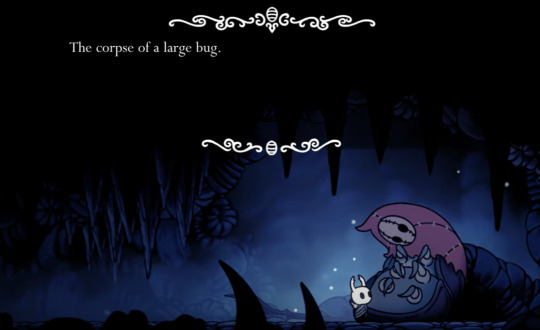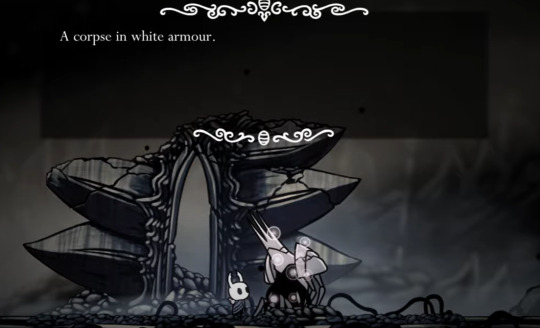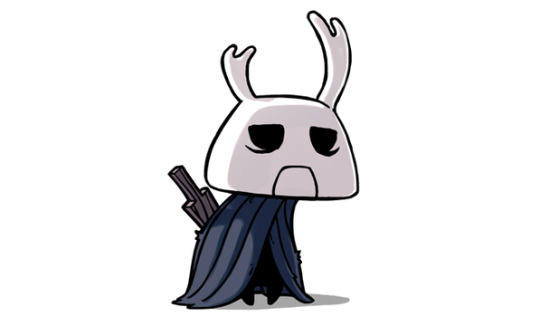#''i must search the area carefully. i must strike swiftly and remorselessly. i must be nimble to avoid danger. i must not fail''
Text
don’t forget that if ghost were to ever speak or communicate in some capacity it would probably sound like




just EXACTLY the amount of information that needs to be conveyed and absolutely nothing more. this fact amuses me and i’m sad that I don’t see it more often
#hk#hollow knight#''i must search the area carefully. i must strike swiftly and remorselessly. i must be nimble to avoid danger. i must not fail''#like DAMN i really like thaaaaaat#sdnl
9K notes
·
View notes
Text
Hungry Knight & Characterizing Ghost
Y’know, it’s interesting, as far into Hollow Knight as I am, and having been aware of Hungry Knight for some time, I haven’t checked it out before very recently. Upon rectifying that, there’s really something interesting in how much of the game is recognizable from this bare bones, two-minute little thing. Obviously there’s a grandiosity and complexity of story that Hollow Knight possesses that Hungry Knight simply couldn’t be of the scale of, but as a sort of primal eggshell the rest of the game hatched out of, it’s very interesting.
The three guardians that are hunted in Hungry Knight are simply boss enemies; they are not given backstory, and hunting them is basically an unambiguously good action. It’s interesting how this progressed to the execution of the Dreamers in Hollow Knight- but what I find illuminating about the Hungry Knight’s journey to its ‘proper’ game sequel is that at its most bare bones, Hungry Knight is a story about Ghost- our Ghost, as we recognize them- who is hailed by Mister Mushroom as the same being, even though he’s sort of breaking the fourth wall to do so and thus Hungry Knight is not in-universe canonical to Ghost’s history- hunting three beings, in order to save the life of a being like themselves.
With many of the major beats of Hollow Knight following an extended, more elaborate imagining of Hungry Knight’s simplistic two-minute plot, I think this characterizes Ghost’s perspective and motives for returning to the kingdom interestingly.
Another related area of interest to me is that Ghost is very finished compared to everything else in this game that received intense reimagining. Their mainstays remain nail attacks and dashing; the hunger system is a clear predecessor of soul- in essence, Ghost as they are in HK does “hunger” and need to “feed” themselves- it’s just that the timing of such is dependent on the damage they take, rather than time.
However- Ghost also, in Hungry Knight, talks. Not to any NPCs in the game world, because they have no one to speak to- but directly to the player.
Ghost speaks twice; in the opening card explaining the controls:
I’m a knight. I have something I need to do.
And I’m hungry.
I need to eat every 10 seconds or I will die.
I must search the area carefully.
I must strike swiftly and remorselessly
I must be nimble to avoid danger
I must not fail, whatever happens. I am ready.
And at the end:
Thank you for your help. I couldn’t have done it without you.
Again, given how polished this proto-Ghost is to the finished character in Hollow Knight, I want to take this as an indicator of how Ghost would speak through some kind of proxy around their voicelessness. What follows is basically take-it-or-leave-it headcanon, but going off Hungry Knight as a guideline:
Ghost is very blunt. They contain a bit of the eloquence that perfumes all dialogue in Hollow Knight, really, and they’re not shy of using fancier language, but they express their ideas in very simple words. They seem to think it’s rather important that they are specifically a knight- and this statement exists in absence of them being a knight of or for anything. They do not seem to have an order or affiliation, or- in fact- loyalty to anything in the game world of Hungry Knight except their fallen friend.
They also show a predilection towards imperatives, which is interesting. Outside of the hunger limit which is a factual stating of boundaries, they cite four edicts with rather intense gravity:
Search the area carefully
Strike swiftly and remorselessly
Be nimble to avoid danger
Do not fail, whatever happens
The existence of these edicts is interesting. The idea of Ghost as someone who internalizes certain things that they take completely seriously and unflinchingly / refuse to compromise on is one not foreshadowed by their very subdued body language. But it betrays a whole host of implied values. That Ghost values precision, caution (they are not reckless in the risks they take) and adaptation, but, also, believes firmly that this caution and adaptation must ultimately serve their end goal.
The biggest reason this is interesting to me? Zote.

Here’s the thing about Zote: he was pretty clearly designed in Ghost’s likeness. Their cloaks are similar. Their weapons are similar. The shape of their horns are similar. While he is in other ways clearly his own character, Zote was conceived as a caricature of Ghost.
Zote insists that he is a principled creature, insists that he is a knight, and has an exhaustive, lengthy list of personal edicts that he insists lead him to success through every situation; however, those edicts are in some ways useless advice; in others, they are useful, but not in the way that a personal creed generally would be.
So, if we’re going off Hungry Knight: Zote as a caricature of Ghost, may, with his 47 Precepts, be caricaturing the idea that Ghost themselves carries and lives by a personal creed.
Some of these things are implied per my earlier headcanon, that the more “neutral-seeming” notes on the top half of the Hunter’s Journal entries represent Ghost’s impressions. These upper-half journal entries, and overall gameplay of Hollow Knight, would seem to align with Ghost’s stated edicts in Hungry Knight.
“I must search the area carefully” -> Ghost’s notes, compared to the Hunter’s, are detailed and factual. They often discuss what weapons a creature uses, whether or not it is trained, its origins... and, take special note of anything that is or used to be a knight, or adhering to a personal creed. (note the sentry enemies in particular, and how much Ghost mentions their hierarchy and weapon choices. The White Defender is also described as “gallant”, in contrast to the dismissive way the Hunter speaks of the Dung Defender). What’s more interesting is that some of the most formidable enemies in the game- Radiance, and Nightmare King Grimm- are given extremely sparing descriptions by Ghost- as if they are struggling to describe what they are beholding.
Likewise, a huge amount of Hollow Knight’s gameplay, especially if you want anything besides the worst ending, or just to make your going easier, involves scouring the game world tenaciously. Both Hornet and Hunter suggest Ghost has a predilection to dogging others’ trails; Quirrel and Cornifer both suggest Ghost is a kindred spirit to them as someone grasped by the love of exploration, and the Old Stag likewise commends them when they open the Queen’s Station.
“I must strike swiftly and remorselessly” -> not only is this one spoofed by Zote (he has a precept about exploiting weaknesses, a precept about felling enemies in a single stroke...) but Ghost is basically never reluctant to throw down with anything that seems about to attack. The Hunter cites Ghost as approaching without fear after he roars at them, and Quirrel’s dialogue outside the mantis village suggests that without much of a clear sense that the mantises are obstructing Ghost’s progress, they’re eager to challenge the Lords. Likewise, the Radiance does not attack you immediately, but Ghost still hops to the highest peak of her domain and tells her exactly how they feel with a single brandished nail.
Likewise, everything Godseeker tells them seems to galvanize them onward, even though initially their motivation may have been curiosity. This even lines up with, according to Hungry Knight, at least, that Ghost defines themselves first by their job, and second by the fact that they have something they need to do- and they do not consider failure any kind of viable option.
As far as remorselessness... there are in fact several times in the game you can cut someone down and then realize afterwards maybe you shouldn’t have. Encountering fully infected Myla is basically set up to encourage it- a player might assume that in defeating her, she could be saved, or just be startled by her attack and retaliate the way that the game has trained us. Her unique dying cry, to me, suggests that the game expected us to hear it.
Likewise, the Nailsmith asks to be cut down, and, if you oblige him, it happens extremely quickly and without effort.
The interesting other side of that is someone who tells themselves to act without remorse, is, generally, someone who is predisposed to regrets- which we know Ghost is, given the canonical information available about the Shade, and that the Shade is already pre-loaded into the Hunter’s Journal on unlock... suggesting Ghost has been forced to contend with it before in the wastelands beyond the kingdom.
Similarly, both Grimm and Brumm in the Grimm Troupe questline prod at the idea that Ghost must make their choice, knowingly, and choose something they won’t regret doing. There’s also the absolutely heartbreaking song of the Hollow Knight battle, and Godseeker’s comments on the Pure Vessel fight that Ghost may yearn to be close to their sibling, but can only get there through combat.
So this particular edict is something emotionally shaky to Ghost- they feel like they have to attack quickly without hesitation, and it’s seen them through many enemies, but... as far as attacking remorselessly- they, uh, don’t always succeed.
“I must be nimble to avoid danger” -> platforming and evasion are huge parts of the game. Given the amount of health bosses have, hanging back, moving around attacks, and finding the right places to heal is an imperative regardless of play style. There are few bosses you can really efficiently face-tank through and you need to do a LOT of charm work, and screaming of either the internal or external variety to succeed there (ask me how I know,) The majority of the upgrades you unlock are about maneuverability.
“I must not fail, whatever happens.” -> Much of the game, especially Hornet, is basically about interrogating Ghost’s resolve, and whether or not they’re okay with what’s going to happen to them. This refusal to give up in the face of outstanding adversity is a huge quality of Ghost’s, and basically one that the game sympathetically cultivates in the player. This is a game with a harsh and demanding learning curve, and, basically, if you’re going to see it through, you need to commit to it.
However, like Ghost’s belief they need to lack remorse, this walks a dicey line. At their worst, Ghost can ignore everyone and everything, write them off as distractions, minimize their observations of their surroundings and blind themselves to everything except the next obstruction in the way of their goal.
However, in that worst ending? Ghost does fail, if you look at what Hungry Knight says about Ghost’s motives. What proto-Ghost thanks the player for is being able to save their friend and leave that place together.
In the base ending of Hollow Knight, Ghost is unable to save Hollow. Instead, they cut Hollow down, and replace them, making a meaningless sacrifice that won’t save anyone else, either- just buy them more time, in a stasis that has already led to decay.
“Thank you, I couldn’t have done it without you.”
All of the better endings are facilitated by engaging with other characters. For Dream No More, you need Hornet and the White Lady’s help, and seeking closure from the Pale King’s body and the bottom of the Abyss. Ghost has to confront their past there- twice- and face, and embrace, their regrets. The opening to dream nail Hollow rather than cutting them down is only created by Hornet believing in Ghost enough to risk her life entering the Black Egg Temple and tackle Hollow to hold them down.
Embrace The Void takes that even further- you need all of those criteria, and then you need to rummage in two different areas, very far away from each other, to find first a key, and then a sarcophagus, and keep prodding the weirdo that falls out of said sarcophagus, even when she’d really rather you didn’t. And even that has unpleasant consequences unless you go even further, and rummage enough to find a way to deliver a Delicate Flower to Godseeker.
Ultimately, Ghost only gets what they want by letting others in. They only accomplish what they do with help. And this is important, when, again, Hungry Knight would point towards the idea that everything Ghost does is to the end goal of saving another person. They want, ultimately, to protect Hollow.
574 notes
·
View notes